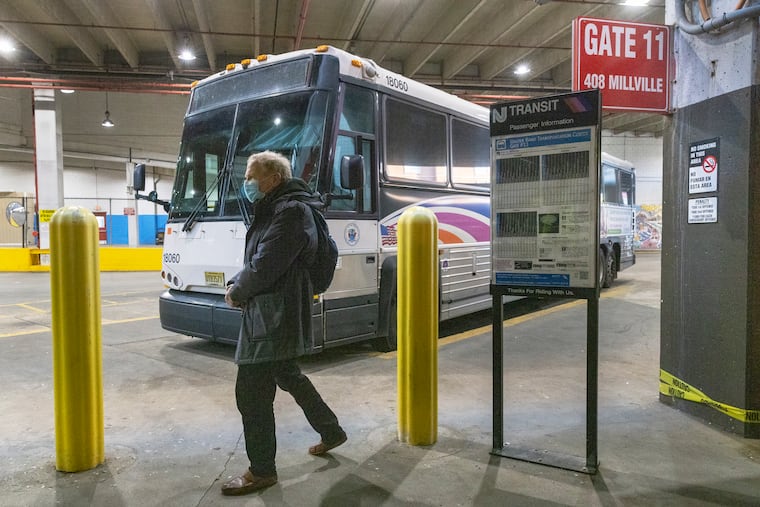NJ Transit will restore commuter bus routes to Philly after uproar.
NJ Transit announced it would restore five bus routes to Center City in June, after abruptly rerouting them to Camden Feb. 28.

The destination sign on the NJ Transit Route 408 bus read “Philadelphia,” as usual, when Laura M. Schultz boarded in Pitman for her regular morning commute.
Halfway through the 75-minute ride in the first week of March, she learned the bus would not be going to Center City anymore. The driver said they’d be dropped off in Camden instead of the Greyhound terminal on Filbert Street, where the route used to end.
“It stunned me,” Schultz said.
Now, two months after leaving hundreds of South Jersey customers in the lurch, NJ Transit has reversed course under criticism and says it will return direct service to Center City in June on five interstate bus lines that had been rerouted to Camden.
Riders are able to transfer in Camden to other NJ Transit bus routes that go to Philadelphia. But many say they have longer commutes, changing buses is inconvenient, and sometimes getting to work also means catching a SEPTA trolley, bus, or subway.
Schultz, a data scientist at Children’s Hospital of Philadelphia in University City, was able to switch to virtual work. She doesn’t own a car.
She said she’ll likely use the 408 again when the service is restored and she moves to a hybrid schedule, with two or three days a week in the office.
NJ Transit “handled all of it poorly,” Schultz said.
» READ MORE: NJ Transit pulls commuter buses from Philly’s Greyhound terminal, citing dangerous space crunch
As of June 25, Routes 317, 408 and 409 will operate with stops at Sixth Street and on Market Street, including near Jefferson Station, said Mike Kilcoyne, general manager of bus operations for NJ Transit. They will then travel several blocks on Broad Street and turn onto Vine Street headed back east.
Routes 313 and 315, which originate in Cape May, will continue farther, to 30th Street Station, Kilcoyne said. Drivers on the five routes will have brief “recovery time” layovers in Camden, he said.
Jennifer Fisher, who also commutes from Pitman to her office in University City, said she’d switch back to the 408 bus if the schedule is similar to what it was before.
“NJ Transit seems to have a real problem communicating and it kind of feels like these decisions are made on the fly,” Fisher said Monday.
The upheaval comes as NJ Transit is in the middle of a redesign of its bus network in Burlington, Camden, and Gloucester Counties, aimed at increasing frequency of service on the most heavily used bus routes there. Many fear Philadelphia service will be reduced again, permanently.
“South Jersey is already underserved compared to the rest of the state when it comes to mass transit,” Sean Mohen, executive director of Tri-State Sustainability, said recently. “We’re not talking about the boonies here.”
Some loyal NJ Transit riders were driven away as the agency struggles to recover from the coronavirus pandemic, and as Philadelphia’s business districts are eager to see as much commuter traffic as possible.
“I’m glad they did what they did,” said William Ritzler, South Jersey coordinator for the Delaware Valley Association of Rail Passengers, a transit advocacy group. He said he didn’t expect it, but he also has received no answer to questions he raised about the change at NJ Transit’s board meeting last month.
“It all does make you wonder what the intent of the leadership is about service to Philadelphia,” Ritzler said Monday.
The transit agency abandoned the Greyhound terminal on Feb. 28 after a traffic reconfiguration cost it some boarding bays and created dangerous turns, officials said.
Buses on the five Philly routes instead began to end and start their runs at the Walter Rand Transportation Center in Camden.
Before the decision to restore the direct service to Center City, NJ Transit CEO Kevin Corbett had said it might not be possible because of a lack of room there, or near 30th Street Station, which he described as bursting at the seams.
“We want them. We want more people coming to Philadelphia on transit,” said Rich Montanez, deputy commissioner for transportation in the Streets Department, which controls bus stops. He said the city will work to accommodate NJ Transit.